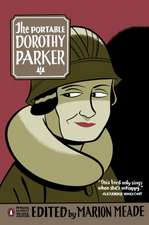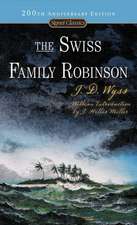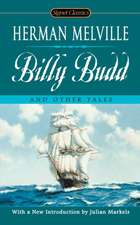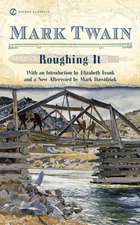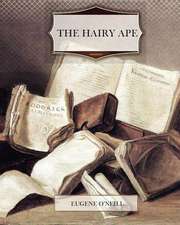The Comedy of Errors: Modern Library Classics (Paperback)
Autor William Shakespeare Editat de Jonathan Bate, Eric Rasmussenen Limba Engleză Paperback – 31 mai 2011
—The Comedy of Errors
Eminent Shakespearean scholars Jonathan Bate and Eric Rasmussen provide a fresh new edition of this raucous story of mistaken identity and family—along with more than a hundred pages of exclusive features, including
• an original Introduction to The Comedy of Errors
• incisive scene-by-scene synopsis and analysis with vital facts about the work
• commentary on past and current productions based on interviews with leading directors, actors, and designers
• photographs of key RSC productions
• an overview of Shakespeare’s theatrical career and chronology of his plays
Ideal for students, theater professionals, and general readers, these modern and accessible editions from the Royal Shakespeare Company set a new standard in Shakespearean literature for the twenty-first century.
Din seria Modern Library Classics (Paperback)
-
 Preț: 62.93 lei
Preț: 62.93 lei -
 Preț: 108.59 lei
Preț: 108.59 lei -
 Preț: 96.71 lei
Preț: 96.71 lei -
 Preț: 117.32 lei
Preț: 117.32 lei -
 Preț: 74.62 lei
Preț: 74.62 lei -
 Preț: 98.78 lei
Preț: 98.78 lei -
 Preț: 86.54 lei
Preț: 86.54 lei -
 Preț: 75.50 lei
Preț: 75.50 lei -
 Preț: 114.93 lei
Preț: 114.93 lei -
 Preț: 138.81 lei
Preț: 138.81 lei -
 Preț: 56.52 lei
Preț: 56.52 lei -
 Preț: 75.50 lei
Preț: 75.50 lei -
 Preț: 56.71 lei
Preț: 56.71 lei -
 Preț: 65.15 lei
Preț: 65.15 lei -
 Preț: 81.47 lei
Preț: 81.47 lei -
 Preț: 89.31 lei
Preț: 89.31 lei -
 Preț: 111.11 lei
Preț: 111.11 lei -
 Preț: 117.16 lei
Preț: 117.16 lei -
 Preț: 55.66 lei
Preț: 55.66 lei - 5%
 Preț: 100.14 lei
Preț: 100.14 lei -
 Preț: 112.38 lei
Preț: 112.38 lei -
 Preț: 84.98 lei
Preț: 84.98 lei -
 Preț: 116.94 lei
Preț: 116.94 lei -
 Preț: 75.68 lei
Preț: 75.68 lei -
 Preț: 86.42 lei
Preț: 86.42 lei -
 Preț: 137.99 lei
Preț: 137.99 lei -
 Preț: 73.64 lei
Preț: 73.64 lei -
 Preț: 127.85 lei
Preț: 127.85 lei -
 Preț: 75.46 lei
Preț: 75.46 lei -
 Preț: 106.63 lei
Preț: 106.63 lei -
 Preț: 109.29 lei
Preț: 109.29 lei -
 Preț: 70.53 lei
Preț: 70.53 lei -
 Preț: 83.94 lei
Preț: 83.94 lei -
 Preț: 70.53 lei
Preț: 70.53 lei -
 Preț: 95.10 lei
Preț: 95.10 lei -
 Preț: 135.68 lei
Preț: 135.68 lei -
 Preț: 105.16 lei
Preț: 105.16 lei -
 Preț: 75.90 lei
Preț: 75.90 lei -
 Preț: 113.03 lei
Preț: 113.03 lei -
 Preț: 88.47 lei
Preț: 88.47 lei -
 Preț: 66.01 lei
Preț: 66.01 lei -
 Preț: 51.16 lei
Preț: 51.16 lei -
 Preț: 46.00 lei
Preț: 46.00 lei -
 Preț: 56.71 lei
Preț: 56.71 lei -
 Preț: 50.10 lei
Preț: 50.10 lei -
 Preț: 50.91 lei
Preț: 50.91 lei -
 Preț: 47.23 lei
Preț: 47.23 lei -
 Preț: 51.57 lei
Preț: 51.57 lei -
 Preț: 46.17 lei
Preț: 46.17 lei
Preț: 45.18 lei
Nou
Puncte Express: 68
Preț estimativ în valută:
8.64€ • 9.03$ • 7.15£
8.64€ • 9.03$ • 7.15£
Carte indisponibilă temporar
Doresc să fiu notificat când acest titlu va fi disponibil:
Se trimite...
Preluare comenzi: 021 569.72.76
Specificații
ISBN-13: 9780812969337
ISBN-10: 0812969332
Pagini: 146
Ilustrații: 10 BLACK-&-WHITE ILLUSTRATIONS
Dimensiuni: 134 x 203 x 13 mm
Greutate: 0.16 kg
Editura: Modern Library
Seria Modern Library Classics (Paperback)
ISBN-10: 0812969332
Pagini: 146
Ilustrații: 10 BLACK-&-WHITE ILLUSTRATIONS
Dimensiuni: 134 x 203 x 13 mm
Greutate: 0.16 kg
Editura: Modern Library
Seria Modern Library Classics (Paperback)
Extras
Act 1 Scene 1 running scene 1
Enter Duke of Ephesus with [Egeon] the merchant of Syracuse, Jailer and other Attendants
EGEON Proceed, Solinus, to procure my fall,
And by the doom of death end woes and all.
DUKE Merchant of Syracusa, plead no more.
I am not partial to infringe our laws;
The enmity and discord which of late
Sprung from the rancorous outrage of your duke
To merchants, our well-dealing countrymen,
Who, wanting guilders to redeem their lives,
Have sealed his rigorous statutes with their bloods,
Excludes all pity from our threat'ning looks,
For, since the mortal and intestine jars
'Twixt thy seditious countrymen and us,
It hath in solemn synods been decreed,
Both by the Syracusans and ourselves,
To admit no traffic to our adverse towns.
Nay, more: if any born at Ephesus
Be seen at any Syracusan marts and fairs,
Again, if any Syracusan born
Come to the bay of Ephesus, he dies:
His goods confiscate to the duke's dispose,
Unless a thousand marks be levièd
To quit the penalty and to ransom him.
Thy substance, valued at the highest rate,
Cannot amount unto a hundred marks,
Therefore by law thou art condemned to die.
EGEON Yet this my comfort: when your words are done,
My woes end likewise with the evening sun.
DUKE Well, Syracusan, say in brief the cause
Why thou departed'st from thy native home,
And for what cause thou cam'st to Ephesus.
EGEON A heavier task could not have been imposed
Than I to speak my griefs unspeakable.
Yet, that the world may witness that my end
Was wrought by nature, not by vile offence,
I'll utter what my sorrow gives me leave.
In Syracusa was I born, and wed
Unto a woman, happy but for me,
And by me, had not our hap been bad.
With her I lived in joy, our wealth increased
By prosperous voyages I often made
To Epidamium, till my factor's death
And the great care of goods at random left,
Drew me from kind embracements of my spouse;
From whom my absence was not six months old
Before herself - almost at fainting under
The pleasing punishment that women bear -
Had made provision for her following me,
And soon and safe arrivèd where I was.
There had she not been long, but she became
A joyful mother of two goodly sons,
And, which was strange, the one so like the other,
As could not be distinguished but by names.
That very hour, and in the self-same inn,
A poor mean woman was deliverèd
Of such a burden, male twins, both alike.
Those, for their parents were exceeding poor,
I bought, and brought up to attend my sons.
My wife, not meanly proud of two such boys,
Made daily motions for our home return.
Unwilling I agreed. Alas, too soon we came aboard.
A league from Epidamium had we sailed
Before the always wind-obeying deep
Gave any tragic instance of our harm.
But longer did we not retain much hope,
For what obscurèd light the heavens did grant
Did but convey unto our fearful minds
A doubtful warrant of immediate death,
Which though myself would gladly have embraced,
Yet the incessant weepings of my wife,
Weeping before for what she saw must come,
And piteous plainings of the pretty babes,
That mourned for fashion, ignorant what to fear,
Forced me to seek delays for them and me.
And this it was- for other means was none -
The sailors sought for safety by our boat,
And left the ship, then sinking-ripe, to us.
My wife, more careful for the latter-born,
Had fastened him unto a small spare mast,
Such as seafaring men provide for storms:
To him one of the other twins was bound,
Whilst I had been like heedful of the other.
The children thus disposed, my wife and I,
Fixing our eyes on whom our care was fixed,
Fastened ourselves at either end the mast,
And floating straight, obedient to the stream,
Was carried towards Corinth, as we thought.
At length the sun, gazing upon the earth,
Dispersed those vapours that offended us,
And by the benefit of his wishèd light,
The seas waxed calm, and we discoverèd
Two ships from far, making amain to us,
Of Corinth that, of Epidaurus this.
But ere they came - O, let me say no more.
Gather the sequel by that went before.
DUKE Nay, forward, old man, do not break off so,
For we may pity, though not pardon thee.
EGEON O, had the gods done so, I had not now
Worthily termed them merciless to us:
For ere the ships could meet by twice five leagues,
We were encountered by a mighty rock,
Which being violently borne up upon,
Our helpful ship was splitted in the midst,
So that in this unjust divorce of us,
Fortune had left to both of us alike
What to delight in, what to sorrow for.
Her part, poor soul, seeming as burdened
With lesser weight, but not with lesser woe,
Was carried with more speed before the wind,
And in our sight they three were taken up
By fishermen of Corinth, as we thought.
At length, another ship had seized on us,
And knowing whom it was their hap to save,
Gave healthful welcome to their shipwrecked guests,
And would have reft the fishers of their prey,
Had not their bark been very slow of sail,
And therefore homeward did they bend their course.
Thus have you heard me severed from my bliss,
That by misfortunes was my life prolonged,
To tell sad stories of my own mishaps.
DUKE And for the sake of them thou sorrowest for,
Do me the favour to dilate at full
What have befall'n of them and thee till now.
EGEON My youngest boy, and yet my eldest care,
At eighteen years became inquisitive
After his brother, and importuned me
That his attendant - for his case was like,
Reft of his brother, but retained his name -
Might bear him company in the quest of him:
Whom whilst I laboured of a love to see,
I hazarded the loss of whom I loved.
Five summers have I spent in farthest Greece,
Roaming clean through the bounds of Asia,
And coasting homeward, came to Ephesus,
Hopeless to find, yet loath to leave unsought
Or that or any place that harbours men.
But here must end the story of my life,
And happy were I in my timely death,
Could all my travels warrant me they live.
DUKE Hapless Egeon, whom the fates have marked
To bear the extremity of dire mishap.
Now trust me, were it not against our laws,
Against my crown, my oath, my dignity,
Which princes, would they, may not disannul,
My soul should sue as advocate for thee.
But, though thou art adjudgèd to the death,
And passèd sentence may not be recalled
But to our honour's great disparagement,
Yet will I favour thee in what I can;
Therefore, merchant, I'll limit thee this day
To seek thy health by beneficial help.
Try all the friends thou hast in Ephesus,
Beg thou or borrow to make up the sum,
And live. If no, then thou art doomed to die.
Jailer, take him to thy custody.
JAILER I will, my lord.
EGEON Hopeless and helpless doth Egeon wend,
But to procrastinate his lifeless end. Exeunt
[Act 1 Scene 2] running scene 1 continues
Enter Antipholus [of Syracuse], a Merchant [of Ephesus] and Dromio [of Syracuse]
MERCHANT OF EPHESUS Therefore give out you are of Epidamium,
Lest that your goods too soon be confiscate.
This very day a Syracusan merchant
Is apprehended for arrival here,
And not being able to buy out his life,
According to the statute of the town,
Dies ere the weary sun set in the west.
There is your money that I had to keep. Gives money
ANTIPHOLUS OF SYRACUSE Go bear it to the Centaur, To Dromiowhere we host,
And stay there, Dromio, till I come to thee.
Within this hour it will be dinner-time.
Till that, I'll view the manners of the town,
Peruse the traders, gaze upon the buildings,
And then return and sleep within mine inn,
For with long travel I am stiff and weary.
Get thee away.
DROMIO OF SYRACUSE Many a man would take you at your word,
And go indeed, having so good a mean. Exit
ANTIPHOLUS OF SYRACUSE A trusty villain, sir, that very oft,
When I am dull with care and melancholy,
Lightens my humour with his merry jests.
What, will you walk with me about the town,
And then go to my inn and dine with me?
MERCHANT OF EPHESUS I am invited, sir, to certain merchants,
Of whom I hope to make much benefit.
I crave your pardon. Soon at five o'clock,
Please you, I'll meet with you upon the mart,
And afterward consort you till bed-time.
My present business calls me from you now.
ANTIPHOLUS OF SYRACUSE Farewell till then. I will go lose myself
And wander up and down to view the city.
MERCHANT OF EPHESUS Sir, I commend you to your own content. Exit
ANTIPHOLUS OF SYRACUSE He that commends me to mine own content
Commends me to the thing I cannot get.
I to the world am like a drop of water
That in the ocean seeks another drop,
Who, falling there to find his fellow forth -
Unseen, inquisitive - confounds himself.
So I, to find a mother and a brother,
In quest of them, unhappy, lose myself.
Enter Dromio of Ephesus
Here comes the almanac of my true date.-
What now? How chance thou art returned so soon?
DROMIO OF EPHESUS Returned so soon? Rather approached too late:
The capon burns, the pig falls from the spit,
The clock hath strucken twelve upon the bell,
My mistress made it one upon my cheek.
She is so hot because the meat is cold,
The meat is cold because you come not home,
You come not home because you have no stomach,
You have no stomach having broke your fast:
But we that know what 'tis to fast and pray
Are penitent for your default today.
ANTIPHOLUS OF SYRACUSE Stop in your wind, sir. Tell me this, I pray:
Where have you left the money that I gave you?
DROMIO OF EPHESUS O, sixpence that I had o' Wednesday last
To pay the saddler for my mistress' crupper?
The saddler had it, sir, I kept it not.
ANTIPHOLUS OF SYRACUSE I am not in a sportive humour now:
Tell me, and dally not, where is the money?
We being strangers here, how dar'st thou trust
So great a charge from thine own custody?
DROMIO OF EPHESUS I pray you jest, sir, as you sit at dinner.
I from my mistress come to you in post,
If I return I shall be post indeed,
For she will score your fault upon my pate.
Methinks your maw, like mine, should be your clock,
And strike you home without a messenger.
ANTIPHOLUS OF SYRACUSE Come, Dromio, come, these jests are out of season,
Reserve them till a merrier hour than this.
Where is the gold I gave in charge to thee?
DROMIO OF EPHESUS To me, sir? Why, you gave no gold to me.
ANTIPHOLUS OF SYRACUSE Come on, sir knave, have done your foolishness,
And tell me how thou hast disposed thy charge.
DROMIO OF EPHESUS My charge was but to fetch you from the mart
Home to your house, the Phoenix, sir, to dinner;
My mistress and her sister stays for you.
ANTIPHOLUS OF SYRACUSE Now as I am a Christian, answer me,
In what safe place you have bestowed my money,
Or I shall break that merry sconce of yours
That stands on tricks when I am undisposed.
Where is the thousand marks thou hadst of me?
DROMIO OF EPHESUS I have some marks of yours upon my pate,
Some of my mistress' marks upon my shoulders,
But not a thousand marks between you both.
If I should pay your worship those again,
Perchance you will not bear them patiently.
ANTIPHOLUS OF SYRACUSE Thy mistress' marks? What mistress, slave, hast thou?
DROMIO OF EPHESUS Your worship's wife, my mistress at the Phoenix;
She that doth fast till you come home to dinner,
And prays that you will hie you home to dinner.
ANTIPHOLUS OF SYRACUSE What, wilt thou flout me thus unto my face
Being forbid? There, take you that, sir knave. Beats Dromio
DROMIO OF EPHESUS What mean you, sir? For God's sake, hold your hands:
Nay, an you will not, sir, I'll take my heels. Exit
ANTIPHOLUS OF SYRACUSE Upon my life, by some device or other
The villain is o'er-raught of all my money.
They say this town is full of cozenage,
As nimble jugglers that deceive the eye,
Dark-working sorcerers that change the mind,
Soul-killing witches that deform the body,
Disguisèd cheaters, prating mountebanks,
And many suchlike liberties of sin.
If it prove so, I will be gone the sooner.
I'll to the Centaur to go seek this slave.
I greatly fear my money is not safe. Exit
Act 2 Scene 1 running scene 2
Enter Adriana, wife to Antipholus [of Ephesus], with Luciana,
her sister
ADRIANA Neither my husband nor the slave returned,
That in such haste I sent to seek his master?
Sure, Luciana, it is two o'clock.
LUCIANA Perhaps some merchant hath invited him,
And from the mart he's somewhere gone to dinner.
Good sister, let us dine and never fret;
A man is master of his liberty:
Time is their master, and when they see time,
They'll go or come; if so, be patient, sister.
ADRIANA Why should their liberty than ours be more?
LUCIANA Because their business still lies out o'door.
ADRIANA Look, when I serve him so, he takes it ill.
LUCIANA O, know he is the bridle of your will.
ADRIANA There's none but asses will be bridled so.
LUCIANA Why, headstrong liberty is lashed with woe.
There's nothing situate under heaven's eye
But hath his bound, in earth, in sea, in sky.
The beasts, the fishes and the wingèd fowls
Are their males' subjects and at their controls.
Man, more divine, the master of all these,
Lord of the wide world and wild wat'ry seas,
Indued with intellectual sense and souls,
Of more pre-eminence than fish and fowls,
Are masters to their females, and their lords:
Then let your will attend on their accords.
ADRIANA This servitude makes you to keep unwed.
LUCIANA Not this, but troubles of the marriage bed.
ADRIANA But, were you wedded, you would bear some sway.
LUCIANA Ere I learn love, I'll practise to obey.
ADRIANA How if your husband start some other where?
LUCIANA Till he come home again, I would forbear.
ADRIANA Patience unmoved! No marvel though she pause,
They can be meek that have no other cause.
A wretched soul, bruised with adversity,
We bid be quiet when we hear it cry.
But were we burdened with like weight of pain,
As much or more we should ourselves complain.
So thou, that hast no unkind mate to grieve thee,
With urging helpless patience would relieve me,
But if thou live to see like right bereft,
This fool-begged patience in thee will be left.
LUCIANA Well, I will marry one day, but to try.
Here comes your man, now is your husband nigh.
Enter Duke of Ephesus with [Egeon] the merchant of Syracuse, Jailer and other Attendants
EGEON Proceed, Solinus, to procure my fall,
And by the doom of death end woes and all.
DUKE Merchant of Syracusa, plead no more.
I am not partial to infringe our laws;
The enmity and discord which of late
Sprung from the rancorous outrage of your duke
To merchants, our well-dealing countrymen,
Who, wanting guilders to redeem their lives,
Have sealed his rigorous statutes with their bloods,
Excludes all pity from our threat'ning looks,
For, since the mortal and intestine jars
'Twixt thy seditious countrymen and us,
It hath in solemn synods been decreed,
Both by the Syracusans and ourselves,
To admit no traffic to our adverse towns.
Nay, more: if any born at Ephesus
Be seen at any Syracusan marts and fairs,
Again, if any Syracusan born
Come to the bay of Ephesus, he dies:
His goods confiscate to the duke's dispose,
Unless a thousand marks be levièd
To quit the penalty and to ransom him.
Thy substance, valued at the highest rate,
Cannot amount unto a hundred marks,
Therefore by law thou art condemned to die.
EGEON Yet this my comfort: when your words are done,
My woes end likewise with the evening sun.
DUKE Well, Syracusan, say in brief the cause
Why thou departed'st from thy native home,
And for what cause thou cam'st to Ephesus.
EGEON A heavier task could not have been imposed
Than I to speak my griefs unspeakable.
Yet, that the world may witness that my end
Was wrought by nature, not by vile offence,
I'll utter what my sorrow gives me leave.
In Syracusa was I born, and wed
Unto a woman, happy but for me,
And by me, had not our hap been bad.
With her I lived in joy, our wealth increased
By prosperous voyages I often made
To Epidamium, till my factor's death
And the great care of goods at random left,
Drew me from kind embracements of my spouse;
From whom my absence was not six months old
Before herself - almost at fainting under
The pleasing punishment that women bear -
Had made provision for her following me,
And soon and safe arrivèd where I was.
There had she not been long, but she became
A joyful mother of two goodly sons,
And, which was strange, the one so like the other,
As could not be distinguished but by names.
That very hour, and in the self-same inn,
A poor mean woman was deliverèd
Of such a burden, male twins, both alike.
Those, for their parents were exceeding poor,
I bought, and brought up to attend my sons.
My wife, not meanly proud of two such boys,
Made daily motions for our home return.
Unwilling I agreed. Alas, too soon we came aboard.
A league from Epidamium had we sailed
Before the always wind-obeying deep
Gave any tragic instance of our harm.
But longer did we not retain much hope,
For what obscurèd light the heavens did grant
Did but convey unto our fearful minds
A doubtful warrant of immediate death,
Which though myself would gladly have embraced,
Yet the incessant weepings of my wife,
Weeping before for what she saw must come,
And piteous plainings of the pretty babes,
That mourned for fashion, ignorant what to fear,
Forced me to seek delays for them and me.
And this it was- for other means was none -
The sailors sought for safety by our boat,
And left the ship, then sinking-ripe, to us.
My wife, more careful for the latter-born,
Had fastened him unto a small spare mast,
Such as seafaring men provide for storms:
To him one of the other twins was bound,
Whilst I had been like heedful of the other.
The children thus disposed, my wife and I,
Fixing our eyes on whom our care was fixed,
Fastened ourselves at either end the mast,
And floating straight, obedient to the stream,
Was carried towards Corinth, as we thought.
At length the sun, gazing upon the earth,
Dispersed those vapours that offended us,
And by the benefit of his wishèd light,
The seas waxed calm, and we discoverèd
Two ships from far, making amain to us,
Of Corinth that, of Epidaurus this.
But ere they came - O, let me say no more.
Gather the sequel by that went before.
DUKE Nay, forward, old man, do not break off so,
For we may pity, though not pardon thee.
EGEON O, had the gods done so, I had not now
Worthily termed them merciless to us:
For ere the ships could meet by twice five leagues,
We were encountered by a mighty rock,
Which being violently borne up upon,
Our helpful ship was splitted in the midst,
So that in this unjust divorce of us,
Fortune had left to both of us alike
What to delight in, what to sorrow for.
Her part, poor soul, seeming as burdened
With lesser weight, but not with lesser woe,
Was carried with more speed before the wind,
And in our sight they three were taken up
By fishermen of Corinth, as we thought.
At length, another ship had seized on us,
And knowing whom it was their hap to save,
Gave healthful welcome to their shipwrecked guests,
And would have reft the fishers of their prey,
Had not their bark been very slow of sail,
And therefore homeward did they bend their course.
Thus have you heard me severed from my bliss,
That by misfortunes was my life prolonged,
To tell sad stories of my own mishaps.
DUKE And for the sake of them thou sorrowest for,
Do me the favour to dilate at full
What have befall'n of them and thee till now.
EGEON My youngest boy, and yet my eldest care,
At eighteen years became inquisitive
After his brother, and importuned me
That his attendant - for his case was like,
Reft of his brother, but retained his name -
Might bear him company in the quest of him:
Whom whilst I laboured of a love to see,
I hazarded the loss of whom I loved.
Five summers have I spent in farthest Greece,
Roaming clean through the bounds of Asia,
And coasting homeward, came to Ephesus,
Hopeless to find, yet loath to leave unsought
Or that or any place that harbours men.
But here must end the story of my life,
And happy were I in my timely death,
Could all my travels warrant me they live.
DUKE Hapless Egeon, whom the fates have marked
To bear the extremity of dire mishap.
Now trust me, were it not against our laws,
Against my crown, my oath, my dignity,
Which princes, would they, may not disannul,
My soul should sue as advocate for thee.
But, though thou art adjudgèd to the death,
And passèd sentence may not be recalled
But to our honour's great disparagement,
Yet will I favour thee in what I can;
Therefore, merchant, I'll limit thee this day
To seek thy health by beneficial help.
Try all the friends thou hast in Ephesus,
Beg thou or borrow to make up the sum,
And live. If no, then thou art doomed to die.
Jailer, take him to thy custody.
JAILER I will, my lord.
EGEON Hopeless and helpless doth Egeon wend,
But to procrastinate his lifeless end. Exeunt
[Act 1 Scene 2] running scene 1 continues
Enter Antipholus [of Syracuse], a Merchant [of Ephesus] and Dromio [of Syracuse]
MERCHANT OF EPHESUS Therefore give out you are of Epidamium,
Lest that your goods too soon be confiscate.
This very day a Syracusan merchant
Is apprehended for arrival here,
And not being able to buy out his life,
According to the statute of the town,
Dies ere the weary sun set in the west.
There is your money that I had to keep. Gives money
ANTIPHOLUS OF SYRACUSE Go bear it to the Centaur, To Dromiowhere we host,
And stay there, Dromio, till I come to thee.
Within this hour it will be dinner-time.
Till that, I'll view the manners of the town,
Peruse the traders, gaze upon the buildings,
And then return and sleep within mine inn,
For with long travel I am stiff and weary.
Get thee away.
DROMIO OF SYRACUSE Many a man would take you at your word,
And go indeed, having so good a mean. Exit
ANTIPHOLUS OF SYRACUSE A trusty villain, sir, that very oft,
When I am dull with care and melancholy,
Lightens my humour with his merry jests.
What, will you walk with me about the town,
And then go to my inn and dine with me?
MERCHANT OF EPHESUS I am invited, sir, to certain merchants,
Of whom I hope to make much benefit.
I crave your pardon. Soon at five o'clock,
Please you, I'll meet with you upon the mart,
And afterward consort you till bed-time.
My present business calls me from you now.
ANTIPHOLUS OF SYRACUSE Farewell till then. I will go lose myself
And wander up and down to view the city.
MERCHANT OF EPHESUS Sir, I commend you to your own content. Exit
ANTIPHOLUS OF SYRACUSE He that commends me to mine own content
Commends me to the thing I cannot get.
I to the world am like a drop of water
That in the ocean seeks another drop,
Who, falling there to find his fellow forth -
Unseen, inquisitive - confounds himself.
So I, to find a mother and a brother,
In quest of them, unhappy, lose myself.
Enter Dromio of Ephesus
Here comes the almanac of my true date.-
What now? How chance thou art returned so soon?
DROMIO OF EPHESUS Returned so soon? Rather approached too late:
The capon burns, the pig falls from the spit,
The clock hath strucken twelve upon the bell,
My mistress made it one upon my cheek.
She is so hot because the meat is cold,
The meat is cold because you come not home,
You come not home because you have no stomach,
You have no stomach having broke your fast:
But we that know what 'tis to fast and pray
Are penitent for your default today.
ANTIPHOLUS OF SYRACUSE Stop in your wind, sir. Tell me this, I pray:
Where have you left the money that I gave you?
DROMIO OF EPHESUS O, sixpence that I had o' Wednesday last
To pay the saddler for my mistress' crupper?
The saddler had it, sir, I kept it not.
ANTIPHOLUS OF SYRACUSE I am not in a sportive humour now:
Tell me, and dally not, where is the money?
We being strangers here, how dar'st thou trust
So great a charge from thine own custody?
DROMIO OF EPHESUS I pray you jest, sir, as you sit at dinner.
I from my mistress come to you in post,
If I return I shall be post indeed,
For she will score your fault upon my pate.
Methinks your maw, like mine, should be your clock,
And strike you home without a messenger.
ANTIPHOLUS OF SYRACUSE Come, Dromio, come, these jests are out of season,
Reserve them till a merrier hour than this.
Where is the gold I gave in charge to thee?
DROMIO OF EPHESUS To me, sir? Why, you gave no gold to me.
ANTIPHOLUS OF SYRACUSE Come on, sir knave, have done your foolishness,
And tell me how thou hast disposed thy charge.
DROMIO OF EPHESUS My charge was but to fetch you from the mart
Home to your house, the Phoenix, sir, to dinner;
My mistress and her sister stays for you.
ANTIPHOLUS OF SYRACUSE Now as I am a Christian, answer me,
In what safe place you have bestowed my money,
Or I shall break that merry sconce of yours
That stands on tricks when I am undisposed.
Where is the thousand marks thou hadst of me?
DROMIO OF EPHESUS I have some marks of yours upon my pate,
Some of my mistress' marks upon my shoulders,
But not a thousand marks between you both.
If I should pay your worship those again,
Perchance you will not bear them patiently.
ANTIPHOLUS OF SYRACUSE Thy mistress' marks? What mistress, slave, hast thou?
DROMIO OF EPHESUS Your worship's wife, my mistress at the Phoenix;
She that doth fast till you come home to dinner,
And prays that you will hie you home to dinner.
ANTIPHOLUS OF SYRACUSE What, wilt thou flout me thus unto my face
Being forbid? There, take you that, sir knave. Beats Dromio
DROMIO OF EPHESUS What mean you, sir? For God's sake, hold your hands:
Nay, an you will not, sir, I'll take my heels. Exit
ANTIPHOLUS OF SYRACUSE Upon my life, by some device or other
The villain is o'er-raught of all my money.
They say this town is full of cozenage,
As nimble jugglers that deceive the eye,
Dark-working sorcerers that change the mind,
Soul-killing witches that deform the body,
Disguisèd cheaters, prating mountebanks,
And many suchlike liberties of sin.
If it prove so, I will be gone the sooner.
I'll to the Centaur to go seek this slave.
I greatly fear my money is not safe. Exit
Act 2 Scene 1 running scene 2
Enter Adriana, wife to Antipholus [of Ephesus], with Luciana,
her sister
ADRIANA Neither my husband nor the slave returned,
That in such haste I sent to seek his master?
Sure, Luciana, it is two o'clock.
LUCIANA Perhaps some merchant hath invited him,
And from the mart he's somewhere gone to dinner.
Good sister, let us dine and never fret;
A man is master of his liberty:
Time is their master, and when they see time,
They'll go or come; if so, be patient, sister.
ADRIANA Why should their liberty than ours be more?
LUCIANA Because their business still lies out o'door.
ADRIANA Look, when I serve him so, he takes it ill.
LUCIANA O, know he is the bridle of your will.
ADRIANA There's none but asses will be bridled so.
LUCIANA Why, headstrong liberty is lashed with woe.
There's nothing situate under heaven's eye
But hath his bound, in earth, in sea, in sky.
The beasts, the fishes and the wingèd fowls
Are their males' subjects and at their controls.
Man, more divine, the master of all these,
Lord of the wide world and wild wat'ry seas,
Indued with intellectual sense and souls,
Of more pre-eminence than fish and fowls,
Are masters to their females, and their lords:
Then let your will attend on their accords.
ADRIANA This servitude makes you to keep unwed.
LUCIANA Not this, but troubles of the marriage bed.
ADRIANA But, were you wedded, you would bear some sway.
LUCIANA Ere I learn love, I'll practise to obey.
ADRIANA How if your husband start some other where?
LUCIANA Till he come home again, I would forbear.
ADRIANA Patience unmoved! No marvel though she pause,
They can be meek that have no other cause.
A wretched soul, bruised with adversity,
We bid be quiet when we hear it cry.
But were we burdened with like weight of pain,
As much or more we should ourselves complain.
So thou, that hast no unkind mate to grieve thee,
With urging helpless patience would relieve me,
But if thou live to see like right bereft,
This fool-begged patience in thee will be left.
LUCIANA Well, I will marry one day, but to try.
Here comes your man, now is your husband nigh.
Recenzii
Praise for William Shakespeare: Complete Works
“Remarkable . . . makes Shakespeare’s extraordinary accomplishment more vivid than ever.”—James Shapiro, professor, Columbia University, bestselling author of A Year in the Life of Shakespeare: 1599
“A feast of literary and historical information.”—The Wall Street Journal
“Remarkable . . . makes Shakespeare’s extraordinary accomplishment more vivid than ever.”—James Shapiro, professor, Columbia University, bestselling author of A Year in the Life of Shakespeare: 1599
“A feast of literary and historical information.”—The Wall Street Journal
Textul de pe ultima copertă
The general editors of the new series of forty-two volumes -- renowned Shakespeareans Stephen Orgel of Stanford University and A. R. Braunmuller of UCLA -- have assembled a team of six eminent scholars who have, along with the general editors themselves, prepared new introductions and notes to all of Shakespeare's plays and poems. Redesigned in an easy-to-read format that preserves the favorite features of the original -- and including an essay on the theatrical world of Shakespeare, an introduction to the individual play, and a note on the text used -- the new Pelican Shakespeare will be an excellent resource for students, teachers, and theater professionals well into the twenty-first century.
Descriere
Descriere de la o altă ediție sau format:
'How many fond fools serve mad jealousy!'The Comedy of Errors is one of Shakespeare's most farcical plays, with not one but two sets of twins sliding past each other into mistakes, violence, and madness. An early romantic comedy, it's often considered an immature play but also a piece of dramatic experimentation. This New Oxford Shakespeare edition examines links between Shakespeare's play and its literary sources and analogues, but also situates it within performance traditions. Illuminating points of comparison between The Comedy of Errors and Shakespeare's other comedies, as well as it's consonances with Shakespeare's later plays of estrangement and loss, this edition provides readers with a nuanced exploration of Shakespeare's shortest play.The New Oxford Shakespeare offers authoritative editions of Shakespeare's works with introductory materials designed to encourage new interpretations of the plays and poems. Using the text from the landmark The New Oxford Shakespeare Complete Works: Modern Critical Edition, these volumes offer readers the latest thinking on the authentic texts (collated from all surviving original versions of Shakespeare's work) alongside innovative introductions from leading scholars. The texts are accompanied by a comprehensive set of critical apparatus to give readers the best resources to help understand and enjoy Shakespeare's work.ABOUT THE SERIES: For over 100 years Oxford World's Classics has made available the widest range of literature from around the globe. Each affordable volume reflects Oxford's commitment to scholarship, providing the most accurate text plus a wealth of other valuable features, including expert introductions by leading authorities, helpful notes to clarify the text, up-to-date bibliographies for further study, and much more.
'How many fond fools serve mad jealousy!'The Comedy of Errors is one of Shakespeare's most farcical plays, with not one but two sets of twins sliding past each other into mistakes, violence, and madness. An early romantic comedy, it's often considered an immature play but also a piece of dramatic experimentation. This New Oxford Shakespeare edition examines links between Shakespeare's play and its literary sources and analogues, but also situates it within performance traditions. Illuminating points of comparison between The Comedy of Errors and Shakespeare's other comedies, as well as it's consonances with Shakespeare's later plays of estrangement and loss, this edition provides readers with a nuanced exploration of Shakespeare's shortest play.The New Oxford Shakespeare offers authoritative editions of Shakespeare's works with introductory materials designed to encourage new interpretations of the plays and poems. Using the text from the landmark The New Oxford Shakespeare Complete Works: Modern Critical Edition, these volumes offer readers the latest thinking on the authentic texts (collated from all surviving original versions of Shakespeare's work) alongside innovative introductions from leading scholars. The texts are accompanied by a comprehensive set of critical apparatus to give readers the best resources to help understand and enjoy Shakespeare's work.ABOUT THE SERIES: For over 100 years Oxford World's Classics has made available the widest range of literature from around the globe. Each affordable volume reflects Oxford's commitment to scholarship, providing the most accurate text plus a wealth of other valuable features, including expert introductions by leading authorities, helpful notes to clarify the text, up-to-date bibliographies for further study, and much more.
Notă biografică
William Shakespeare (1564 - 1616) was an English poet, playwright, and actor, widely regarded as the greatest writer in the English language and the world's greatest dramatist. He is often called England's national poet and the "Bard of Avon". His extant works, including collaborations, consist of some 39 plays, 154 sonnets, and two long narrative poems. His plays have been translated into every major living language and are performed more often than those of any other playwright. Shakespeare was born and raised in Stratford-upon-Avon, Warwickshire. At the age of 18, he married Anne Hathaway, with whom he had three children: Susanna and twins Hamnet and Judith. Sometime between 1585 and 1592, he began a successful career in London as an actor, writer, and part-owner of a playing company called the Lord Chamberlain's Men, later known as the King's Men. At age 49 (around 1613), he appears to have retired to Stratford, where he died three years later. Shakespeare produced most of his known works between 1589 and 1613. His early plays were primarily comedies and histories and are regarded as some of the best work produced in these genres. Until about 1608, he wrote mainly tragedies, among them Hamlet, Othello, King Lear, and Macbeth, all considered to be among the finest works in the English language.
Cuprins
List of illustrations; Acknowledgements; Preface to first edition; Abbreviations; Introduction by Ros King: Shakespeare's main source: Plautus's Menaechmi; Shakespeare's first tragicomedy; Shakespeare's schooling and the construction of The Comedy of Errors; Casting the twins; Verse form and metrication; The first known performance: Gray's Inn 1594; Later productions; Note on the text; List of characters; THE PLAY; Appendixes: 1. The performance of 1594; 2. Passages from the Bible; Reading list.
Caracteristici
Lengthy illustrated introduction discusses key issues of theatrical and critical history, as well as the play's historical context and questions of genre and style

